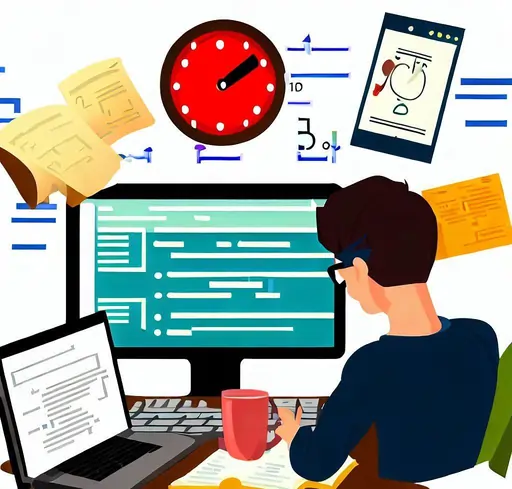- Recognize The Requirements For The Assignment:
It's essential to have a firm understanding of the assignment requirements in order to effectively plan your days while working on programming homework with a short due date. Spend some time carefully reading the instructions, and mark the important goals and due dates. Recognize the problem statement and what the assignment's intended result is.

Pay attention to any particular tools, frameworks, or programming languages that must be used as well. This information will help you make wise resource and time allocation decisions. To make sure that your code adheres to the necessary standards, familiarize yourself with any coding conventions or guidelines that have been provided.
Make sure to write down any specific features or functionalities that must be implemented. You can divide the assignment into smaller tasks and set aside time for each one if you are aware of the assignment's scope and its various components.
- Break The Assignment Down:
- Determine Free Time And Set Task Priorities:
- Create A Daily Schedule:
- Use The Time Blocking Technique:
- Set Both Short-Term And Long-Term Objectives:
- Give Your Health And Wellbeing Top Priority:
- Leverage The Resources That Are Available:
- Evaluate And Refine:
- Prepare For Emergencies:
Planning is made easier by dividing the programming homework up into smaller, more manageable tasks. Start by determining the key elements or modules needed to complete the task. For instance, user authentication, database integration, and front-end development might be included in the components of a web application.
Once you've determined the main elements, further divide them into focused subtasks. For instance, the front-end development module's tasks might include UI design, responsive layout implementation, and JavaScript interactivity addition. This thorough breakdown will give you a clear road map and assist you in setting up an effective work schedule.
To keep track of all the different tasks, think about using a task management program or a straightforward to-do list. If necessary, you can further divide each task into smaller steps. By concentrating on one task at a time, this strategy makes the overall workload seem more manageable.
Time management is essential when completing programming homework with a short deadline. Start by determining how much time you have left before the deadline. Consider additional obligations like classes, work, or personal responsibilities. Calculate how much time you can actually spend on programming tasks each day.
Prioritize your tasks based on their importance and complexity once you have an idea of the time you have available. Determine the essential tasks that must be finished first to ensure the project's overall success. Take into account how task dependencies may affect the timeline overall.
Take into account both the immediate needs and the overall project objectives when determining task priorities. It's important to complete tasks in the proper order because some tasks may depend on others. Setting priorities will help you allocate your time and effort more wisely and prevent you from wasting them on less important tasks.
The development of a daily schedule is crucial for the implementation of effective time management. To plan your day, think about using a planner, a digital calendar, or productivity software. Set aside specific times for working on programs, taking breaks, eating, and other activities.
Be honest with your time estimates when creating your schedule. Consider the difficulty of the tasks, potential obstacles or debugging time, and the need for mental rest periods. Setting aside enough time for each task will aid in maintaining your focus and avoiding undue pressure or rushing.
Take into account your individual preferences and daily energy levels. Allocate your most difficult or crucial tasks to the morning if you're more productive then. Make adjustments to your schedule to reflect your unique working style while still taking into account outside factors like deadlines or teamwork requirements.
Time blocking is a useful strategy to improve productivity and concentration while working on your scheduled programming projects. Set aside uninterrupted periods of time to work on particular projects. Distractions should be avoided during these blocks of time by turning off your phone's notifications, closing useless browser tabs, and finding a quiet place to study.
You can fully engage in problem-solving and coding by allocating focused time to each task. You can keep your focus with this technique, which also encourages finishing each task quickly and within the allotted time.
Use productivity tools or methods, such as the Pomodoro Technique, where you work for focused periods of time and then take brief breaks. Investigate various time frames to determine what maintains your focus and productivity the best for you.
Setting specific objectives is essential for efficient planning. Set both immediate and long-term goals for your programming assignments. Short-term objectives might be to finish a certain module, fix a coding error, or complete a certain feature.
On the other hand, long-term objectives are more general and pertain to finishing the assignment as a whole before the due date. To give yourself plenty of time for testing and debugging, you might, for instance, set a deadline for finishing all the programming tasks.
A sense of direction and motivation are provided by having specific goals in mind. It enables you to monitor your development and make sure your planning is on track.
To track your progress and maintain a sense of accomplishment, divide your long-term goals into more manageable milestones. To maintain motivation throughout the project, commemorate the achievement of each milestone.
While finishing your programming homework should be your main priority, don't forget about your health and general wellbeing. You'll be more productive and intelligent overall if you take care of yourself.
To recharge your brain and avoid burnout, take regular breaks. To relieve stress and reenergize your energy, engage in physical activity or practice mindfulness. To support your mental and physical well-being, make sure you get enough sleep and eat a balanced diet.
Think about incorporating hobbies, meditation, or physical activity into your daily routine. When you return to your programming tasks, these activities can help you relax, reduce stress, and sharpen your focus.
Remember that your wellbeing has a direct impact on your productivity and capacity to effectively plan your days. Making self-care a priority will lead to increased performance in all areas, including concentration and problem-solving abilities.
Never be afraid to ask for assistance or to make use of the resources available when dealing with difficult programming tasks or concepts. Online programming communities, forums, or classmates with expertise in the field can offer helpful advice.
If you require more information on a particular subject, speak with your tutors or instructors. Sharing your problems or concerns with others can frequently result in a better comprehension and more effective problem-solving.
To further your understanding and hasten your progress, use additional pertinent programming resources like books, online tutorials, documentation, or programming libraries. These resources can offer workarounds, code snippets, or explanations that will enable you to get around problems faster.
Always remember to properly cite and credit any sources you use, adhering to any rules or policies your institution has established regarding academic integrity.
Effective planning must include regular review and revision. Analyze your progress and the caliber of your work on a regular basis. Review your code carefully, fix any issues, and optimize any algorithms or data structures.
Debugging and code review are essential steps in the programming process. Set aside particular times to review your code and find any potential bugs or issues. To find and correct errors, use debugging tools, print statements, or step-by-step execution.
Review your project's overall organization and structure in addition to the code. Make sure your code is modular, well-documented, and adheres to best practices. If necessary, refactor your code to make it easier to read and maintain.
Make use of this time to improve the assignment's overall structure and to make sure your code is clear, effective, and compliant with coding standards. Regular review and revision will help you stay on track, catch any errors or oversights, and avoid last-minute emergencies or hurried submissions.
Any project may run into unforeseen difficulties or setbacks. It's crucial to prepare for unforeseen difficulties by allotting extra time. Having this extra time gives you the flexibility to deal with unforeseen circumstances without sacrificing the overall standard of your work or missing the deadline.
Be ready for potential obstacles like running into difficult bugs, having trouble integrating external libraries or APIs, or unanticipated system problems. You'll be better prepared to deal with such difficulties and maintain your productivity and motivation if you plan for some buffer time.
Additionally, think about creating backup plans or alternative strategies in case of unforeseen circumstances. Have a backup plan in place, for instance, if a particular feature or component is proving to be trickier than anticipated. This will allow you to simplify or modify the requirements without sacrificing overall functionality.
Keep in mind that being adaptable is essential when handling unforeseen difficulties. You can navigate through challenges more skillfully and reduce their impact on your overall progress by anticipating contingencies and being ready to modify your plan.
Conclusion:
When it comes to handling programming homework with a short deadline, effective planning is essential. The steps in the planning process are understanding the assignment requirements, segmenting tasks, figuring out how much time is available, and setting priorities. Your work will have structure and direction if you use time blocking, set clear goals, and create a daily schedule.
Always put your health and wellbeing first, make the most of your resources, and set aside time for regular review and revision. You can effectively plan your days, lower your stress level, and complete your programming homework successfully even with short deadlines by using these all-inclusive strategies.
